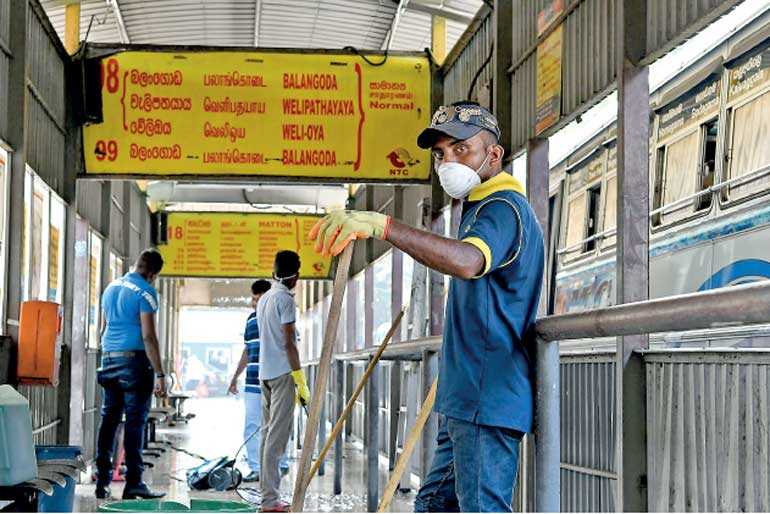Saturday Feb 21, 2026
Saturday Feb 21, 2026
Wednesday, 18 March 2020 00:00 - - {{hitsCtrl.values.hits}}

POSEUR – passionate – Pic by Shehan Gunasekara
‘Love in the Time of Cholera’ is a well-known novel by Gabriel García Márquez, the Nobel prize-winning Colombian author. It is a complex tale, cleverly weaving in divergent strands of fact and fantasy; romance and reality; truth and troublesome aberrations about what is commonly believed to be true. And like all fiction – and in this case, ‘magic realism’ – novels are full of lies that tell us the truth about life and love, over and over again.
In Spanish, the original title of the 1985 book was El amor en los tiempos del cólera. The Spanish word cólera can refer to the disease of cholera, as well as the strong passion which the Greek physician Galen believed was caused by an excess of choler (yellow bile). And the story examines the often asked question whether strong passion is a boon or a bane to human love. Maybe in Sri Lanka today, on the cusp of an incipient coronavirus epidemic, we’re poised to find out.
But first: a few definitions of ‘choler’.
Choler: an irritable petulant feeling. 
Choler: a strong emotion; a feeling that is oriented towards some real or contrived grievance.
Choler: the irritable humour that was once believed to be secreted by the liver; and to cause anger or ire.
These will be the dominant strands of thought as SARS-CoV-2 exposes a tropical island nation’s nakedness before viral nature. Also as COVID-19 strips our people of all pretences – power, position, prestige, privilege – to reveal our common, fragile, shared, humanity.
True love
In ‘Love in the Time of Cholera’, an irritable petulant feeling is the subdued counterpoint to much of the main character’s pursuit of true love. Disappointed by the loss of his youthful romantic fantasy, the protagonist pursues a seemingly unending series of amorous adventures. Perhaps readers might avoid the trap that the author has set for the superficial peruser of this profound story? By realising that even sentimental stories can have deeper cynical origins.
In Sri Lanka today, an irritable petulant feeling dominates social media – especially, in the aftermath of a certain schools’ cricket encounter and the revelation that a reveller at that Big Match could be our island-nation’s ‘Patient 31’ (the South Korean who single-handedly infected 80% of cases in that country, where 30 others before him hadn’t, because he failed to practise social distancing).
We’re disappointed – even irritable, and petulant to boot – about the tribalism (“It’s tradition, so no two words: we’re doing it come what may!”) and triumphalism (“We’re hale and hearty and have survived worse: so no way it’ll affect us, no?”) that prevailed around the phenomenon.
Perhaps critics and commentators may avoid falling into a deeper void by realising that their petulance and irritability reflects an externalisation of all that is foolish and selfish in their own self too? Which of us has not prioritised our own well-being over that of others at any given time? Maybe not as ignorantly as the socialites or as arrogantly as pompous boasters on social media, right? Still… may grace and mercy and peace prevail – over all our passions!
Two-faced
The theme of strong emotion toward external objects dominates ‘Love in the Time of Cholera’. Our protagonist pursues romantic notions from conjugal partners to gullible attempts at salvaging treasure from a shipwreck – perhaps ignoring the deeper passions that are causing turmoil in his very being. That married couple are deemed perfectly matched by society, although their union is hardly the ideal partnership that others think it is. Also the sensitive charm of the narrator gulls the naïve or sentimental reader into accepting even his sinister motives as being noble or honourable, or at the very least romantic.
The worst are full of passionate intensity in Sri Lanka today. From regimes seeking to consolidate their power base through elections to ministering devils masquerading as angels of mercy demanding nationwide lockdown. It is clear that the centre cannot hold if it doesn’t abandon political ambition in favour of a more humanitarian form of disciplined governance. There are two sides to the strong emotionality of determined romantics – the ‘ideal’ and the ‘depraved’ – whether they’re pursuing people they love in fiction or power they lust after through franchise.
Span that gap!
The ancients believed that yellow bile caused human beings to be choleric: irritable and angry, and even driven to distraction by dominant passions. ‘Love in the Time of Cholera’ divides that humour equally between two main characters who have (respectively) too much love, honour, respect, reputation, riches, and rewards – and too little of all of these. One of them pursues sensual gratification to blunt the pain of his empty romantic conquests. The other clinically and anatomically wages war on the sickness of society around him, while remaining a hero to those who benefit from his largesse; but less noble to others who know his inner motivations better.
Sri Lanka today is on the verge of secreting the type of bile – both black (bitter/melancholic) and yellow – that will make or break us: as a nation; as a society; as a country; as a civilisation. The best lack all conviction… other than the pursuit of self-preservation and safety and security of their tribe, at great interpersonal, relational and societal cost. Mere anarchy stands to be let loose upon the world if nation, state and citizenry don’t bridge the chasm between ideals and romanticism; between truth and fiction; between strong passions and a more balanced, inclusive and tolerant approach to life and death in the time of coronavirus.
Lend a helping hand, a spare mask, the extra soap, even as you look to the lives of yourself and your own…
And do your bit
Today as I write this out in your yesterday morning, I await the president’s address to the nation in my own real-time night of my tonight for tomorrow’s comment. One can only hope… and yet, be – and get – real. Last best hope? Or the late great letdown rather than a lockdown! That the government – up-to-date, and as systematically and dynamically as possible – has done as much as it can in terms of damage control and disaster mitigation, is clear from the updates.
It might appear that short of lockdown, there have been lapses and loopholes. Which the law and security establishment are doing their level-best to right and fill – in a single day that may well lengthen into a long week or solitary month or singular year for paradise, as well as its planet. But in the main, the state has shown leadership can be about practical action rather than propagandistic activity. So corporate Sri Lanka and civil society have a model to emulate.
True, big business by and large has (with the possible exception of those bumptious old boys who are still trumpeting their herd immunity, the silly cows) cooperated in sensible preventative measures.
But the private sector is yet to show itself as proactive and professional as one would wish for the engine of growth under severe mechanical stress before fuel runs out in our flight from the fiction of paradise to the reality of an entire planet facing lockdown.
To give but one example: how about all private hospitals voluntarily becoming nationalised (‘romantic’) or setting up dedicated state-controlled free COVID-19 screening clinics (‘real’)?
Fourth estate it seems has abdicated its role and responsibility in favour of – or been ousted by – social media. And academia in denial about the nature of the beast may never be the same again unless it steps up to the plate. Society at home and abroad is facing its severest test. National survival as much as our joint humanity is at stake…
And when this is all over – for surely ‘this too shall pass’ – the world will not be the same. May it be a better, wiser, more maturely tolerant and inclusive, compassionate, considerate Sri Lanka that emerges!
[Journalist | Editor-at-Large of LMD | Writer on viral culture (politics, ‘just not cricket’ etc.)]